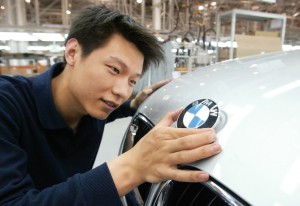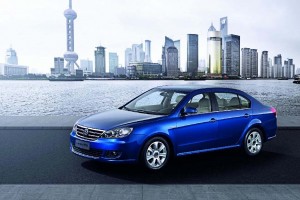Chinese consumers are proving as fickle as their counterparts in the United States, according to a new study by the Boston Consulting Group, and that may be good news for German car brands there.
Roughly 40% of the owners of cars from Chinese makers planning to trade their vehicle for a global or “foreign” brand said they intend to buy a Volkswagen model. Nearly 90% of foreign volume-brand owners who are trading up said they are likely to buy an Audi, BMW or Mercedes-Benz, according to the group, known as BCG.
China remains the world’s largest automobile market with sales expected to top 21 million units this year, dwarfing sales in the U.S., Western Europe and Japan, the industry’s traditional key markets.
The demand for new vehicles in China is expected to grow again in 2015 despite tough restrictions on sales in Beijing, China’s largest city, where sales have been sharply reduced this year by government edict, according to analysts from IHS Automotive. Chinese authorities also levied heavy fines this year on foreign companies, accusing them of restraint of trade or being monopolies.
Donald Zhang, a BCG project leader and a co-author of the report, said the stakes are particularly high in China because it tends to be a winner-take-all market.
“Chinese car buyers seem to be converging on a handful of brands that have solid reputations for being safe choices,” he said.
Overall, the BCG study, which was based on in-depth interviews with more than 2,400 consumers across China, found that three-quarters of China’s car buyers are planning on switching brands when they get ready to buy their next vehicle.
The shifts could be particularly painful for Chinese domestic companies, many of the quite small, which are facing something like a consumer revolt, according to BCG.
Roughly 85% of the owners of cars manufactured by domestic Chinese companies, which tend to produce the least expensive vehicles, said that they plan to switch brands — and only 30% indicated that they plan to buy another Chinese brand, the BCG study found
But global companies such as General Motors, Hyundai, Nissan, Toyota and even Volkswagen face challengers in holding on to their current customers. Foreign “volume brand” cars, which cost $13,000 to $41,000, could lose 70% of their current customers, while around 57% of owners of foreign premium cars, BCG noted.
The impending “brand migration” will affect every segment of China’s auto market, noted the BCG report, noting customer loyalty levels in China are below those reported in surveys of car owners in developed economies.
(Luxury makers stretch out with long-wheelbase models. For more, Click Here.)
“Until now, many carmakers have focused on winning over first-time buyers in the global automotive industry’s greatest growth market. But neither domestic Chinese carmakers nor foreign brands can take their gains for granted,” said Marco Gerrits, a BCG partner who heads the firm’s automotive sector in Greater China.
(Click Here for details about the spark behind Nissan’s Leaf truck.)
A significant portion of China’s increasingly affluent consumers want to trade up to higher-quality or more prestigious brands, and now that they can afford to do so, according to BCG. Many customers are planning to upgrade their vehicles but millions are identified in the study as “brand shifters” who plan to switch to a different brand within the same segment because they are dissatisfied with various aspects of the cars they now drive.
Owners of non-luxury cars from Chinese brands most frequently cited a desire for better quality, better performance and dealer experience as their reasons for switching brands, the BCG study found.
(To see more about Renault’s 235-mpg Eolab concept, Click Here.)
“The most urgent challenge for domestic Chinese brands is to continue improving their vehicles and dealer networks — but without losing their cost advantage,” said Alex Xie, a principal in BCG’s Shanghai office.
By contrast, owners of foreign cars who plan to switch to competing brands in the same category primarily cite concerns over reliability, safety and high maintenance costs, while those trading up are looking for better accessory features, after-sales service, and cars that convey greater social status.
Among premium-car owners, those prepare to shift brands seek more comfort and superior after-sales service, and upgraders mainly want more luxury.



All of those U.S. dollars generated by imported CRAP from China that is undermining the U.S. economy are available to buy expensive Euro toys such as upscale cars. It’s unfortunate the U.S. doesn’t impose a proper tariff on Chinese imports to make them cost comparative to U.S. produced goods. The last thing the U.S. needs is more unemployment and more Chinese CRAP. It’s killing the U.S.